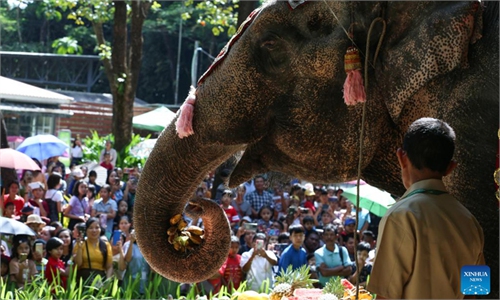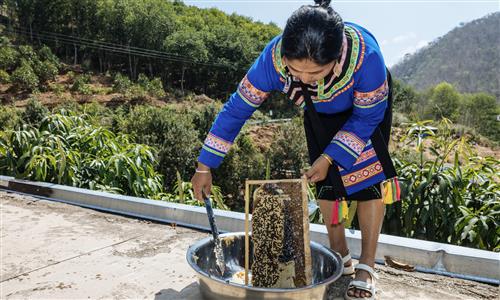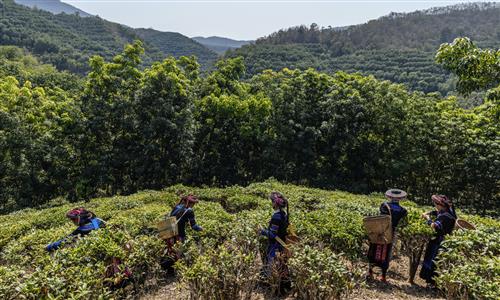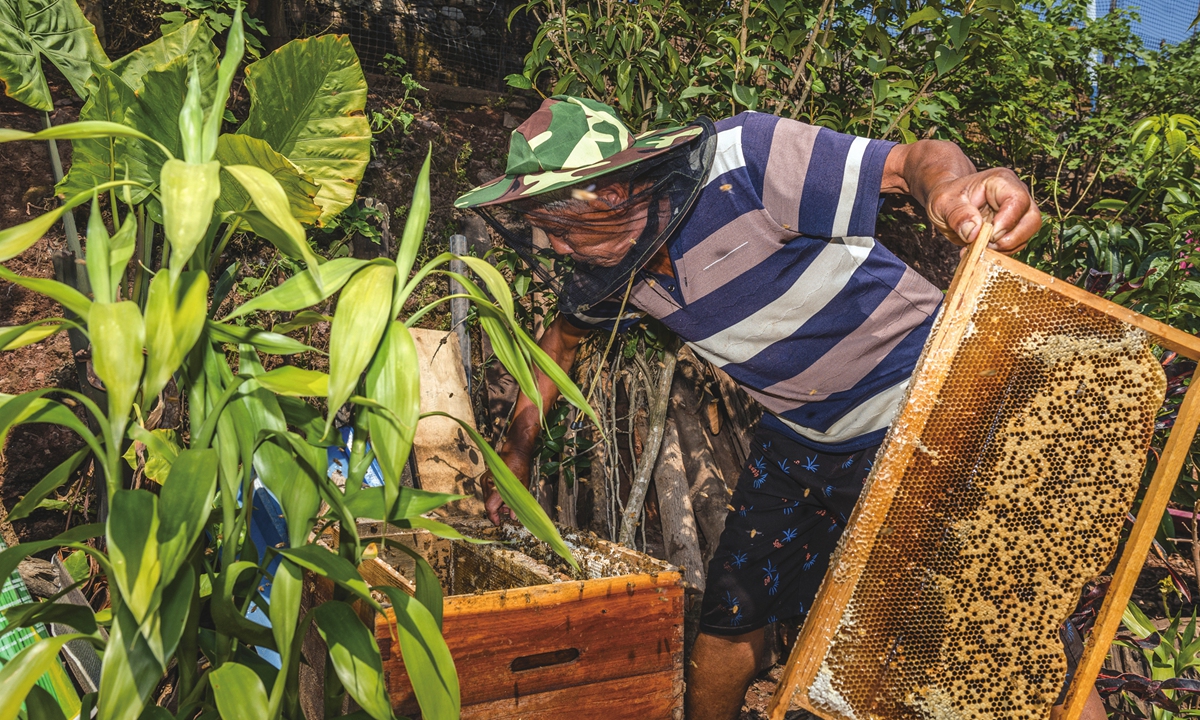
Luo Baolin, 70, inspects his beehives in Daotangqing village, Jinghong, Xishuangbanna Dai autonomous prefecture, Yunnan Province, on May 13, 2024.Luo is known as the "Beekeeping King" of the village. Photo: Li Hao/GT
A bee weighs 0.1 grams, while an Asian elephant can reach 5 tons.However, despite their small size, these tiny insects are aiding in the recovery of elephant populations and mitigating human-elephant conflicts.
With China's intensified ecological conservation efforts, the population and activity range of elephants have gradually expanded. In Southwest China's Yunnan Province, the population of wild elephants has grown from 120 in the 1980s to over 300 today.
As conservation efforts grow stronger and villager awareness improves, the number of elephants in China continues to rise, while the range of activities are also expanding. The overlap of elephant activity with human living and production areas has put constraints on some villagers, making the alleviation of this conflict a current conservation goal.
In recent years, in some rural areas in Yunnan, the local governments and volunteers have been promoting industrial transformation, with beekeeping being a key project. This has not only helped achieve rural carbon reduction but also allowed villagers to work at home, reducing direct contact with elephants.
Zhang Jiangmei, a villager from Daotangqing village, has taken up beekeeping for elephant protection. In 2020, with the help of the reserve and volunteers, Zhang joined the beekeeping program. From initially fearing bee stings to now having a wealth of knowledge about the insects, Zhang has experienced the benefits of beekeeping.
She no longer ventures deep into the mountains to collect wild fruit and mushrooms but prefers to take care of her bees at home. Beekeeping has increased her annual income by more than 7,000 yuan ($1,080), and she now has more time to spend with her children.
Located deep in the mountains of the Xishuangbanna Dai Autonomous Prefecture, Daotangqing village is home to 34 families, mainly of the Yi ethnic group. In 1997, the villagers moved from the core area of the reserve, leaving their homeland to the elephants.
Currently, some wild elephants are also active near Daotangqing village, occasionally visiting the villagers' fields to enjoy a feast.
Zhang is involved in a project aimed at promoting Asian elephant conservation through community livelihood development. It was launched in June 2020 by the International Fund for Animal Welfare (IFAW), Yunnan Xishuangbanna National Nature Reserve Administration Menyang Management Station, and the Xishuangbanna Tropical Rainforest Conservation Foundation.
The project provides each participating village household with 10 boxes of Chinese honey bees, along with full support.
For Zhang, elephants have been part of her life since she was a child. "When the elephants come, I was told 'Do not go out. They are just hungry. Don't disturb them, and they will leave after eating,'" she said.
Now, Zhang has a deeper understanding of the relationship between people and elephants, and she recognizes the significance of her beekeeping. "I tell everyone, 'You taste the sweetness of my honey, and I benefit, as do the elephants,'" Zhang said. "Additionally, beekeeping also protects the forest. In Xishuangbanna, we have elephants, and we have primitive forests; our beekeeping aims not to disturb the elephants."
The project empowers residents to engage in beekeeping and eco-friendly farming, enhancing skills and income, reducing losses caused by elephant activities, and reducing human-elephant conflicts. Moreover, the project mobilizes community involvement in habitat conservation and restoration, gradually replacing rubber with eco-friendly crops to improve the ecosystem, creating a buffer zone for both elephants and residents.
After three years of project advancement, the beekeeping skills of community villagers have matured. From the project's inception in 2020 to August 2023, the 25 participating village households have collectively harvested 35,290 kilograms of high-quality honey, increasing their income by nearly 200,000 yuan.
Some of these bees, in partnership with high-end online supermarkets, have their honey sold in major cities like Beijing and Shanghai, with the profits helping subsidize the villagers and supporting the sustainable development of the beekeeping project.
"When we initiated the project, it was to promote development and propel the protection of Asian elephants," Cao Dafan, project lead of the Asian Elephant Protection project, told the Global Times. "We started from an economic perspective by increasing villager income and reducing their hostile attitudes toward the elephants. The villagers' attitudes toward elephants depended on the losses caused by the elephants. By promoting economic development and changing production methods, we can transform the relationship between villagers and elephants."
"Another one of our initial intentions for establishing the project was also to explore elephant deterrence measures based on the Chinese honey bee," said Cao, who has nearly 20 years of experience in human-elephant conflict mitigation.
He stated that methods have been established and that trials would be conducted in the future, noting that there have been successful cases abroad, primarily using African honey bees. Recently in Thailand, beekeeping has achieved success rate of nearly 48 percent to keep elephants away.
Cao mentioned that if the triggering devices and the stress behaviors of the bee colonies are improved, the success rate might increase.
In addition to beekeeping, villagers in elephant habitats help the animals in other ways.
Behind Zhang's house are 30 solar panels, which, under the scorching sun of Xishuangbanna, supply all the electricity needs of her six-person family, with excess energy fed back into the grid, providing extra income. The generation of this renewable energy also offsets the carbon emissions from transporting honey.
Villagers also have gained environmental knowledge. Wang Shaokuan, a villager from Daotangqing, originally thought carbon reduction meant collecting carbon dioxide and bottling it in Coca-Cola.
In December 2023, Daguangang Township's Konggeliudui village, located 15 kilometers from Daotangqing, also joined the beekeeping project. The first batch of 100 bee colonies was distributed to 10 community households during a launch ceremony.
Dao Fachang, the village's head, told the Global Times that multiple elephant herds, about 60, are active near the village, often visiting villager farmlands and even entering their courtyards to steal food. The villagers primarily earn their livelihoods through rubber tapping and tea cultivation, but forest operations often lead to encounters with elephants.
"The food stored in our granaries is also eaten by them. Sometimes, the elephants even consume the villagers' homemade alcohol, then collapse drunk on the road and sleep until morning. But they are protected animals, and we cannot do much about it," Dao added, noting that the government provides compensation to villagers, which is promptly deposited into their accounts.
In addition to beekeeping, this Hani ethnic village has also increased its income by cultivating tea and selling ethnic embroidery products, easing human-elephant conflict.
Experts have also conducted field surveys and tailored ecological planting plans, guiding community residents to develop livelihoods in more environmentally friendly ways.
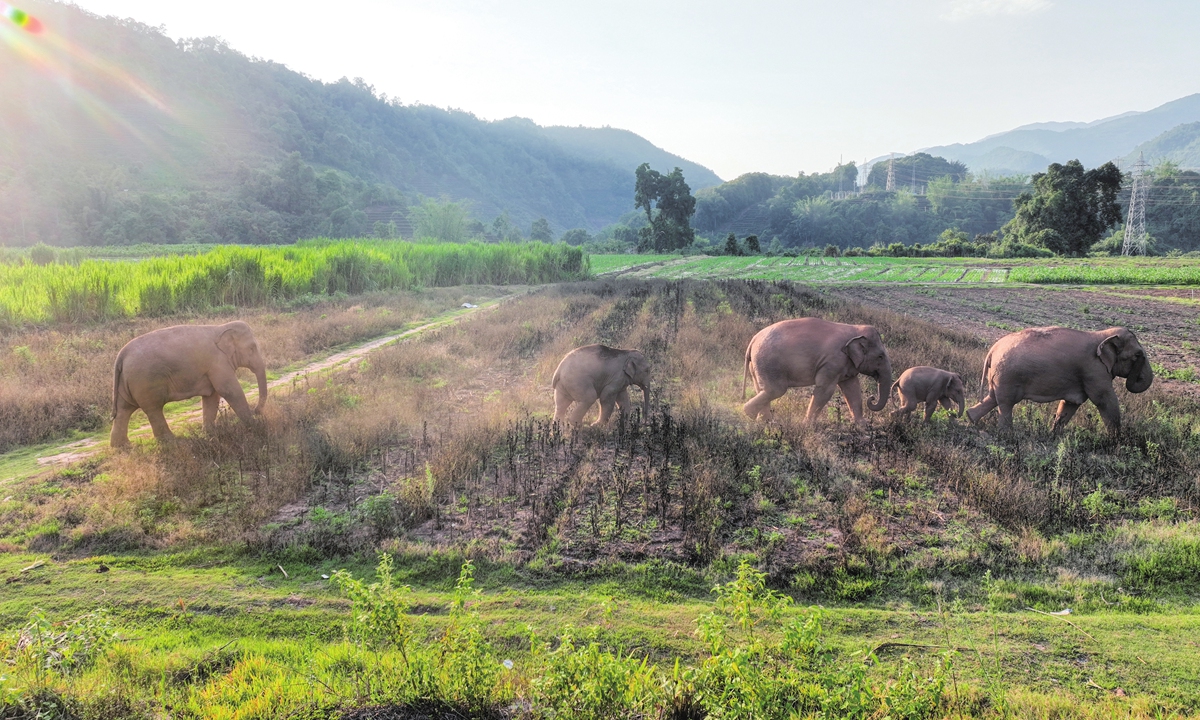
Several wild Asian elephant herds appear in Kangping town, Jiangcheng Hani and Yi autonomous county, Pu'er, to forage for corn, bananas, and other foods on February 9, 2024. Photo: VCG
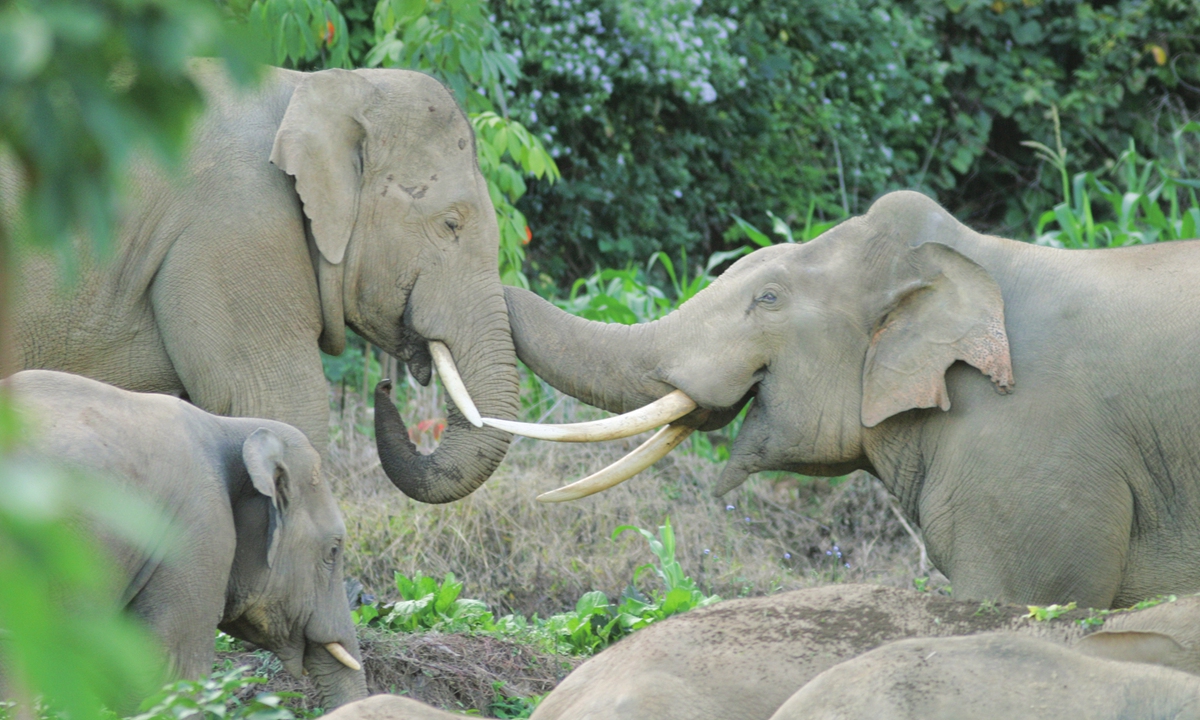
Wild Asian elephants play in Pu'er in 2010. Photo: Courtesy of Cao Dafan
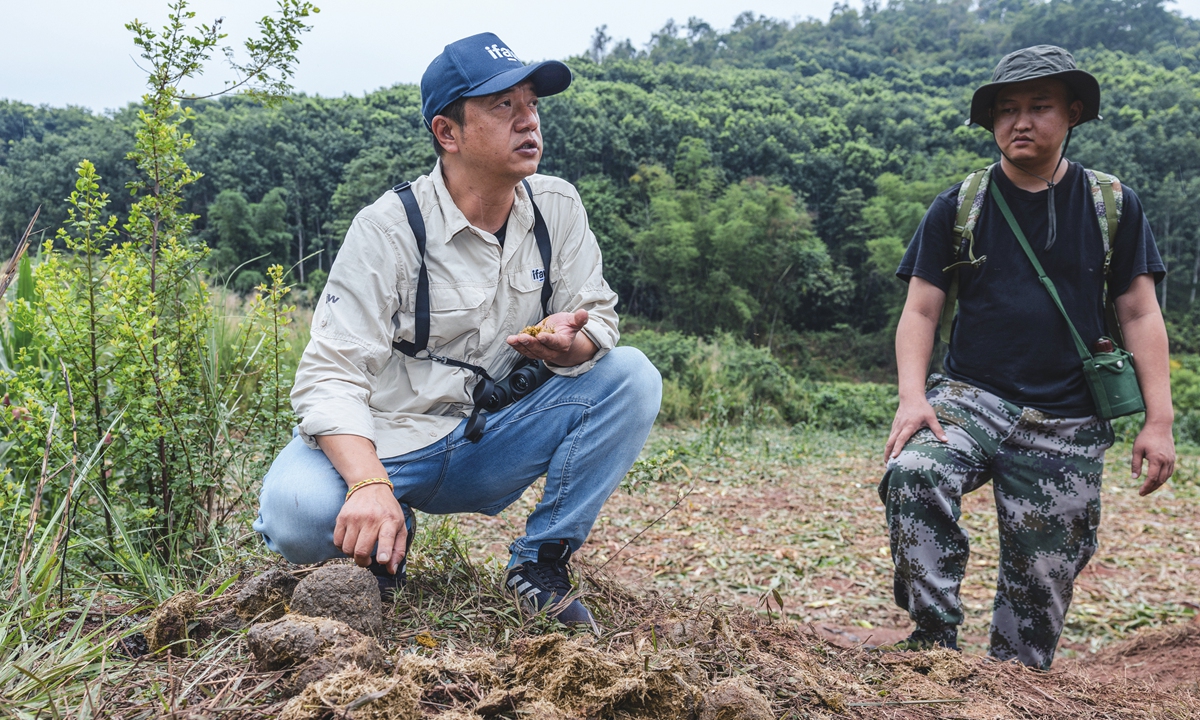
Asian elephant conservation expert Cao Dafan and elephant ranger Li Shengqian inspect signs of elephant activity in the mountains of Mengla county, Xishuangbanna on May 12, 2024. Photo: Li Hao/GT
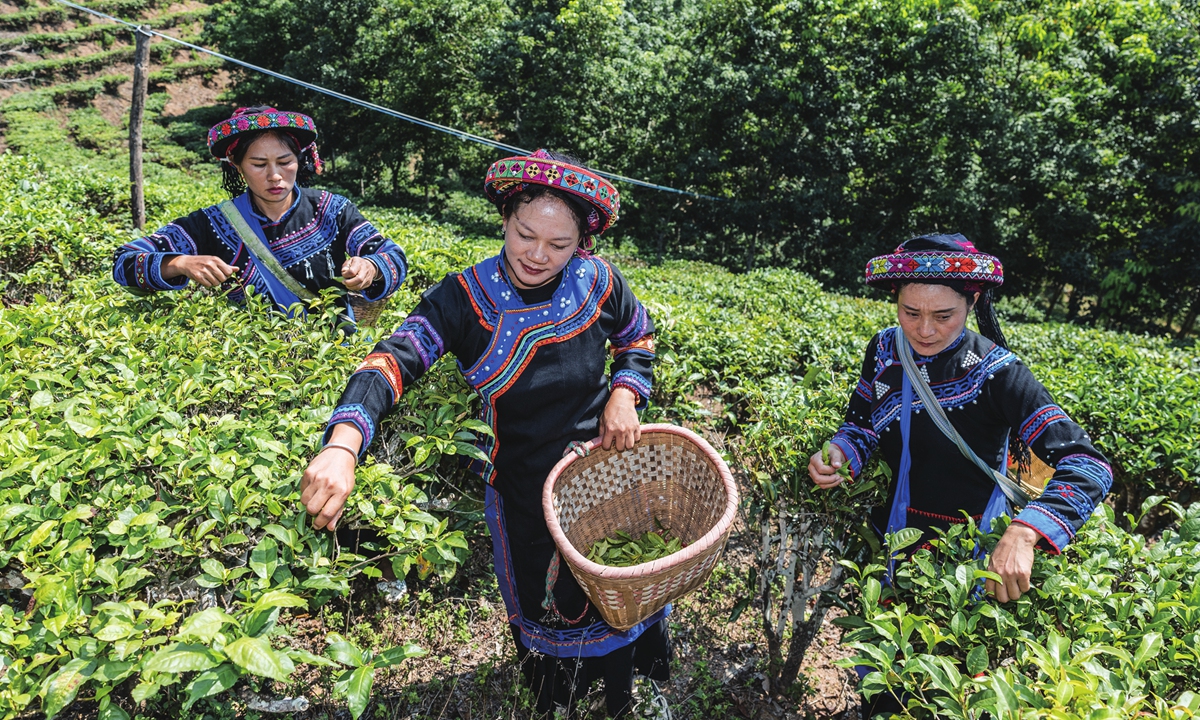
Women from Konggeliudui village, Xishuangbanna Dai autonomous prefecture, Yunnan, dressed in traditional Hani attire, pick tea leaves on a mountain in Yunnan Province, on May 13, 2024. Photo: Li Hao/GT
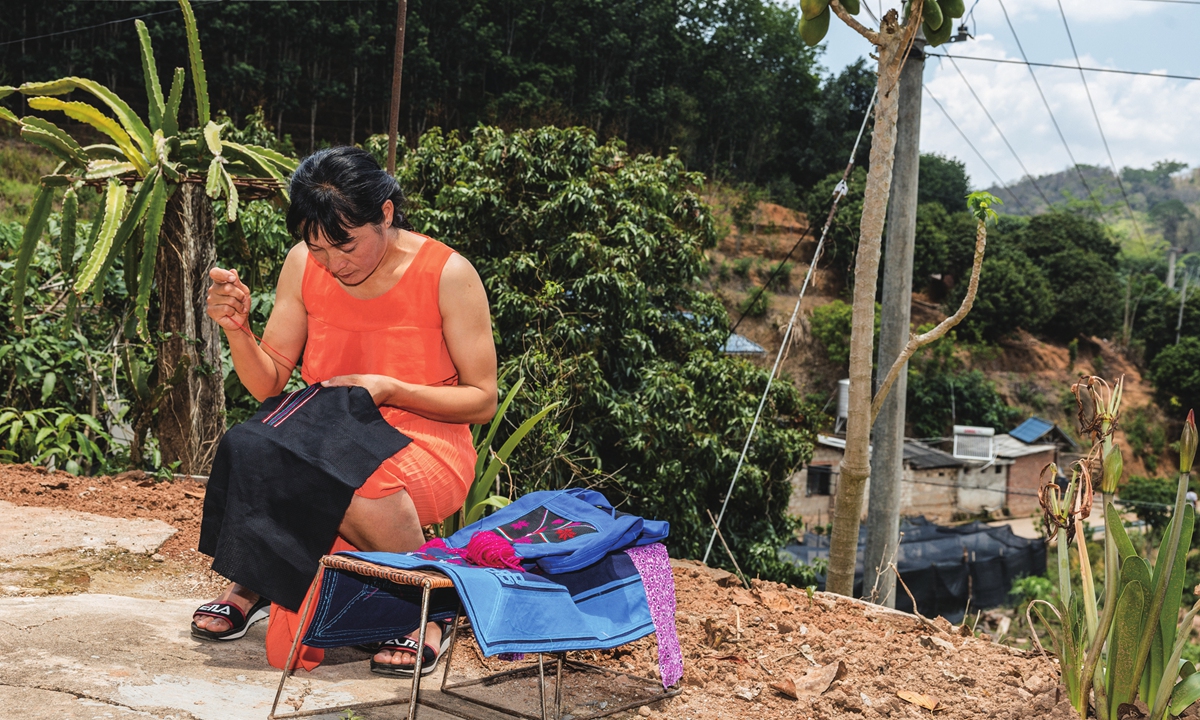
Women from Konggeliudui village embroider traditional Hani patterns on clothing in Yunnan Province, on May 13, 2024. Photo: Li Hao/GT

An infrared camera captures Asian elephants foraging in a field in Pu'er, Southwest China's Yunnan Province, on May 17, 2023. Photo: VCG

